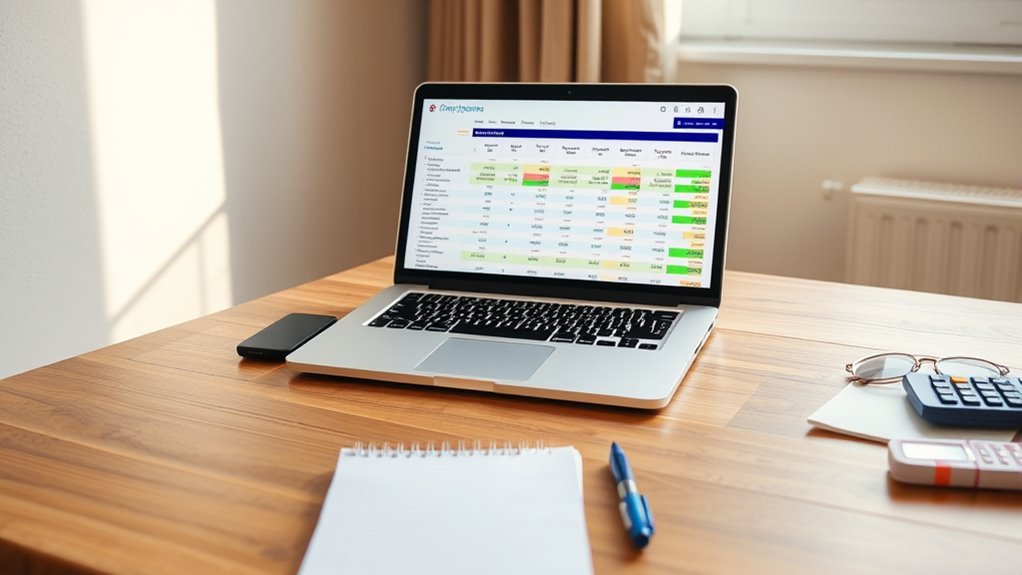Creating a budget starts with gathering all your financial info, including income sources and expenses. Set specific, realistic goals like saving a certain amount or paying off debt. Build your budget by listing income and fixed costs, then track your spending regularly to spot areas for adjustments. Stay committed by finding accountability and celebrating small wins. If you wanna learn how to craft a solid budget and keep on track, keep exploring these essential steps.
Key Takeaways
- Gather all income sources and expenses to understand your financial situation before creating a budget.
- Categorize expenses and set spending limits for essentials, savings, and discretionary spending.
- Use budgeting tools or apps to track expenses daily and ensure accuracy.
- Regularly review and adjust your budget to stay aligned with your financial goals.
- Find accountability partners and set rewards to stay motivated and committed to your budget.
Understanding the Importance of Budgeting

Understanding the importance of budgeting is essential because it gives you control over your finances and helps you achieve your goals. When you prioritize financial literacy, you become better at managing your money and making informed decisions. A budget highlights your spending habits, revealing where your money goes and where you can cut back. By tracking expenses, you can prevent overspending and build savings. Budgeting also reduces financial stress, making it easier to plan for future needs. Knowing your financial situation empowers you to set realistic goals, whether it’s paying off debt or saving for a big purchase. Ultimately, understanding budgeting helps you develop healthier spending habits, leading to greater financial stability and peace of mind.
Gathering Your Financial Information

To start gathering your financial information, you need to identify all your income sources and record them accurately. Then, track your expenses carefully to understand your spending habits. Additionally, organize your financial documents so you can easily access everything you need when creating your budget. Incorporating signs of spoilage and other related costs can help you identify areas where you might cut costs and improve your overall financial planning. Employing budgeting tips such as reviewing and adjusting your budget monthly can further enhance your financial management skills.
Collect Income Sources
Have you already gathered all the sources of income that contribute to your household finances? Knowing your total income is essential for effective budgeting. Make a list of every income source, including salaries, freelance work, rental income, and any side hustles. Focus on source diversification to guarantee you’re not overly reliant on a single income stream, which enhances your income stability. Be thorough—don’t forget irregular payments or seasonal earnings. This all-encompassing overview helps you understand how much money is coming in each month and identifies potential gaps. Having clear, accurate income data provides a solid foundation for budgeting and decision-making, making it easier to set realistic financial goals and plan for the future. Recognizing the importance of a Mental Wellbeing Index can also support your financial planning by helping you maintain emotional resilience during financial challenges. Additionally, understanding fatherhood quotes can serve as a motivational reminder of the importance of stability and support in your life. Being aware of your income sources is also crucial for managing unexpected expenses and building an emergency fund.
Track Expenses Accurately
Once you’ve identified your income sources, the next step is to track your expenses accurately. You can do this by verifying receipts and recording every purchase. Receipt verification helps guarantee you don’t overlook small expenses that add up over time. Using digital tools like budgeting apps makes tracking easier and more organized. These apps can automatically import transactions from your bank accounts and categorize your spending, saving you time. Be diligent about recording expenses daily, rather than waiting until the end of the week or month, to maintain accuracy. Keeping detailed records helps you see where your money goes and highlights areas to cut back. Incorporating data-driven strategies can optimize your budgeting process and ensure measurable results over time. Additionally, leveraging insights from AI-powered tools can further enhance the accuracy and efficiency of expense tracking. Understanding dog breeds and their characteristics can also help pet owners anticipate costs and plan accordingly for their pet’s needs. Recognizing spending patterns through detailed expense tracking can reveal unexpected areas for savings and improve your overall budgeting effectiveness.
Organize Financial Documents
Gathering your financial information is a crucial step in organizing your budget. Start by collecting all relevant documents, such as receiving invoices from service providers and bills from vendors. Organize receipts from daily purchases, categorizing them by expense type like groceries, transportation, or entertainment. Use folders or digital apps to keep these documents accessible and in order. Make sure to include bank statements, pay stubs, and any financial records that reflect your income and expenses. By systematically gathering and arranging these documents, you’ll have a clear picture of your financial situation. This organization makes it easier to track spending accurately, identify areas to cut costs, and prepare for future budgeting. Additionally, maintaining a record of your financial documents enhances accountability, and streamlining your process can help you maintain a consistent budget over time. Keeping your documents well-organized can also help you quickly spot inconsistencies or errors in your financial records such as unrecognized charges, saving you time during financial reviews. Being aware of your financial overview is essential for creating an effective budget, and maintaining organized records supports ongoing financial health. Staying organized now saves time and stress later, and understanding your financial overview is essential for creating an effective budget.
Setting Realistic Financial Goals

To set realistic financial goals, you need to define clear targets that are achievable within your means. Focus on prioritizing essential expenses first to guarantee your basic needs are met. By doing so, you create a solid foundation for reaching your financial aspirations. Incorporating healthy sleep habits can help you track your progress and stay motivated toward your goals. Understanding financial compatibility can also improve your ability to plan and manage shared expenses effectively.
Define Clear Targets
Setting clear, realistic financial goals is essential for effective budgeting. When you define targets, you create benchmarks to measure your progress and establish spending limits. These goals should be specific, attainable, and time-bound to keep you motivated and focused. For example, saving for an emergency fund or paying off debt are common benchmarks. Use this table to visualize your targets:
| Goal Type | Example |
|---|---|
| Short-term | Save $1,000 in 3 months |
| Long-term | Pay off $5,000 credit card debt in a year |
| Savings | Build 3 months’ expenses |
| Spending limits | Max $200 weekly dining out |
| Investment goals | Contribute $200/month to retirement |
Clear targets help you stay disciplined, ensuring your spending stays within your financial benchmarks.
Prioritize Essential Expenses
Prioritizing essential expenses guarantees your financial goals stay realistic and achievable. Focus on covering necessities like housing, utilities, and food first before considering discretionary spending. By doing so, you ensure that your core needs are met without compromising your savings prioritization efforts. Limiting discretionary spending helps free up funds to build an emergency fund or contribute to long-term goals. Once essential expenses are secured, you can allocate remaining funds toward savings and debt repayment. Additionally, incorporating proper prioritization strategies can improve your overall financial health and help maintain discipline. Recognizing the regulatory framework that impacts your investments can further align your budgeting with your financial plan. Remember, setting realistic financial goals depends on understanding your priorities and sticking to them. Proper prioritization guarantees your spending aligns with your long-term objectives, making it easier to stay committed and avoid financial stress.
Building Your Budget: Step-by-Step

Creating a budget might seem overwhelming at first, but breaking it down into clear steps makes the process manageable. Start by gathering your financial information and using budgeting tools to organize your income and expenses. Use creative visualization to picture your financial goals clearly—this motivates you to stay committed. Then, follow these steps:
- List your sources of income and fixed expenses.
- Track variable costs to see where your money goes.
- Set realistic spending limits based on your priorities.
- Adjust your budget as needed, focusing on your financial goals.
Breaking it down this way helps you stay focused and confident. Remember, using budgeting tools and visualizing success keeps you inspired to stick with your plan every step of the way.
Tracking Spending and Making Adjustments

After establishing your budget, the next important step is to keep a close eye on your spending. Regular expenses review helps you see if you’re staying within your planned spending categories. Track every expense, noting how much you spend in each category to identify patterns and overspending. Adjustments are key—if you notice you’re consistently exceeding your limits, revise your budget or spending habits accordingly. Use this table to monitor your categories:
| Spending Category | Actual Spending |
|---|---|
| Housing | $ |
| Food | $ |
| Transportation | $ |
| Entertainment | $ |
| Savings | $ |
Keeping a close watch allows you to make informed adjustments, ensuring your budget remains realistic and effective.
Tips for Staying Committed to Your Budget

Sticking to your budget can be challenging, but staying committed is essential for reaching your financial goals. To boost your dedication, consider these tips:
- Find accountability partners who motivate you and hold you responsible for sticking to your plan.
- Set up reward systems to celebrate small wins, reinforcing positive habits.
- Track your progress regularly to stay aware of your spending habits and adjust if needed.
- Remind yourself of your long-term goals, keeping your motivation high during tough moments.
Frequently Asked Questions
How Often Should I Review and Update My Budget?
You should review and update your budget at least once a month. Regular check-ins help you stay aligned with your financial goals and guarantee you’re tracking expenses accurately. Life changes, like a new job or unexpected costs, can impact your budget, so adjusting it accordingly keeps you on track. Consistent updates allow you to identify areas to save or cut back, making your financial plan more effective and realistic.
What Tools or Apps Are Best for Budgeting?
For digital budgeting and expense tracking, you should try apps like Mint, YNAB, or PocketGuard. These tools help you monitor your spending, set financial goals, and stay on top of your budget effortlessly. They sync with your bank accounts, making expense tracking seamless. Choose an app that fits your needs and preferences, and you’ll find it easier to stick to your budget and manage your finances effectively.
How Can I Stay Motivated to Stick to My Budget Long-Term?
Ever wonder how to stay motivated long-term? The secret lies in using motivational strategies like setting small, achievable goals and celebrating progress. Find accountability partners who can encourage you and hold you accountable. Keep reminding yourself of your financial dreams and visualize the benefits. These tactics create momentum, making it easier to stick to your budget. Stay committed, and you’ll transform your financial habits over time.
What Should I Do if I Overspend One Month?
If you overspend one month, don’t panic. First, review your expense tracking to see where you went over. Then, tap into your emergency fund if needed to cover essential costs. Moving forward, adjust your budget to prevent future overspending. Focus on building your emergency fund and tracking expenses closely, so you’re prepared next time. Consistent monitoring keeps you on track and helps you recover quickly from setbacks.
How Can I Plan for Irregular or Unexpected Expenses?
Think of your budget as a ship steering unpredictable seas. To handle unexpected storms, you need an emergency fund—your safety anchor—and expense forecasting to anticipate rough waters. Regularly set aside a small portion of your income for surprises, adjusting as needed. This way, you stay steady even when surprises surface, ensuring your financial voyage remains smooth and secure despite unforeseen expenses.
Conclusion
Now that you know the steps to create and stick to your budget, imagine the freedom you’ll feel as your financial goals come into focus. Every expense you track brings you closer to the life you desire, but the real challenge lies ahead—staying committed when temptations arise. Will you let fleeting urges derail your progress or seize control and watch your future unfold? The choice is yours—your financial journey has just begun.










